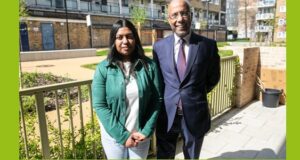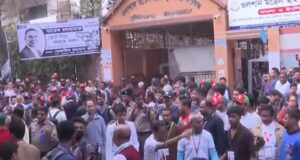Emdad Rahman meets Battle of Cable Street veteran Max Levitas

I’m shuffling my feet and perspiring just inside the entrance of the Whitechapel Idea Store. The security operative glances at me occasionally. Foolishly thinking I’m being funny, I give the gentleman a goofy grin and flash him my T shirt. “Cable Street – They shall not pass” it reads. I decide to take a stroll upstairs and fortunately catch my target in the lift on the way down. For once being too lazy to walk down one flight of steps has reaped dividends.
I’m meeting a real East End legend. Meet 96 year old Max Levitas, a survivor of the 1936 Battle of Cable Street. Levitas was a community activist during a period of history that is reminiscent of modern day Britain. The only difference though were the scapegoats. Darker elements within British society opposed immigration and blamed the Jews for taking up all the jobs, houses and opportunities. It’s a chilling echo of the reality of today, whereby the value of immigrants are ignored as they face frequent and undisguised racism. It’s pretty much the same mantra today. The hostility is further spread by fear mongering by politicians and the media. Racism it seems, has a more acceptable face in 2011.
Levitas was part of the mass mobilisation of protesters that barred the British Union of Fascists (BUF) from passing at Cable Street. The young Levitas had long been a thorn in the rear for Oswald Mosley’s BUF, having been arrested and fined £10.00 in 1934 for using Nelson’s column as a graffiti noticeboard, calling on the masses to unite and reject the fascists.
Levitas, who after the Second World War served Stepney for 15 years as a Communist party Councillor believes Cable Street was a turning point in the history of this country.
He said: “It was a giant step forward for all of us, but had taken a long time to come. We had been opposing fascists since 1930. As a proud Communist party member, I watched as we joined together with the London trade union movement to bring about a force of 100,000 to confront and oppose Oswald Mosley at Hyde Park.
“News arrived that Mosley and his Blackshirts intended to march through the East End. We were both worried and angry and called on the Synagogues to join us. The Communist party of Great Britain was at the forefront of the planned protest against the Fascists and became involved in discussions with the Jewish Board of Deputies, who worried of safety had encouraged people to stay at home and not join in the protests.
“Our efforts began to pay off. I was a factory shop steward with a large work force and with the Labour movement and trade unions, we approached businesses and tenant associations. We leafletted and organised public speaking events and loudspeaker rallies. We didn’t have the Internet but we all worked hard for our beliefs and were committed to spreading the message that fascism must be opposed. In this way we reached thousands of people.”
The Blackshirts faced an impenetrable wall of steel comprising of over 100,000 united workers, locals, Communists, Irish and Jews. Levitas recollected the events of the fourth of October 1936.
“The Dockers stood shoulder to holder with East Enders. We barricaded our streets, even overturning a tram to block entry into a road. The Fascists were met with the full force of the East End. They were pelted and even with horses they could not get through.
“Their march failed and the Commissioner of Police said that if his officers had not intervened then there would have been fatalities.
“Never again will they be able to march here.”
Levitas say’s that education is key in fighting racism: “Education is the fuel for tolerance. This country has seen a wave of immigrants, the French, Jews from Eastern Europe, Irish, Bangladeshi, Somali, Arabs and Eastern Europeans. This is a tolerant country and as long as we work hard and respect each other, this country will prosper and be the envy of the world.”
The veteran believes that racial intolerance, civil unease and the recent turmoil in the shape of the UK riots has been partly fuelled by an irresponsible government.
“Today we have the lib Lab government coalition making drastic cuts against working people. They are closing down industry and strangling people of their air supply. The government is responsible for making life hell for the likes of people in Tower hamlets.
“If you don’t fight the government cuts then the crisis will deepen and racism and fascism will increase because people will look at others to blame for their bad luck. This is how fascism increases and becomes powerful.
With the presence of the EDL is Levitas worried about the future of race relations? “The East End I know has always united against injustice. Look at the history of this country. It has thrived because of the contribution of visitors. Humans are strange creatures and I dream that we are capable of balancing ourselves out and live in unity and harmony.
“The East End was united then, and it shall remain united now and in the future. I may not live to see it but I am confident that tolerance will win the day. We can live together, we can live in peace. “
emdad@eastlondonnews.co.uk
 East London News A Force for the community…
East London News A Force for the community…



